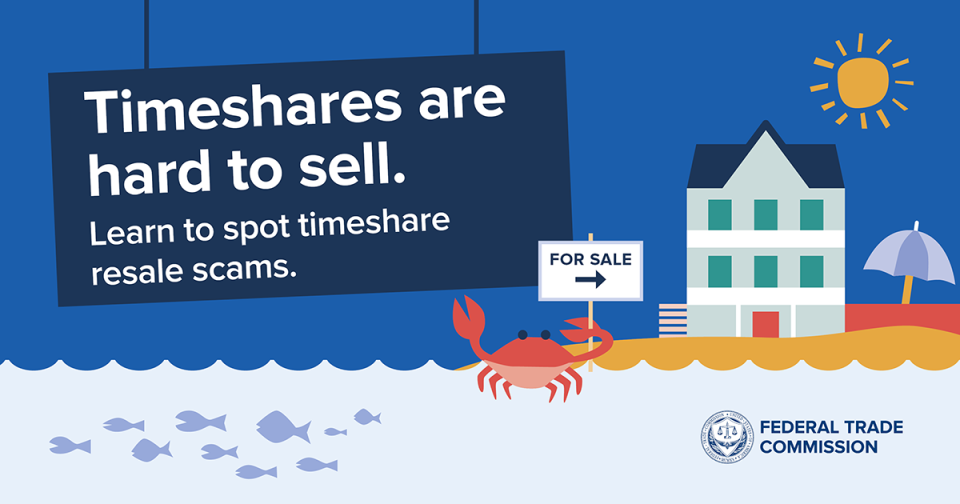Maybe you weren’t thinking about selling your timeshare — but suddenly, someone calls and tells you they’re a real estate agent and have an interested buyer. They might have information about you and your property, so the offer seems credible. Then, the so-called timeshare expert asks you to pay upfront to finalize the deal. Stop. That could be a scam.
Scammers are getting using public records to target people in the U.S. who own timeshares abroad — including a focus on older adults, who may not use their timeshares as often. These “real estate agents” start by asking for a small fee, promising to help you make big money selling your timeshare. But that ask turns into demands for thousands of dollars…before you find out there’s no buyer, your money’s gone, and that “agent” was a scammer.
Timeshares are hard to sell and only a scammer will tell you they already have a buyer or can find one fast. If you want out, it’s best to start by contacting the timeshare company directly.
To avoid a timeshare resale scam:
- Don’t pay upfront fees. Only scammers demand fees before they help you sell your timeshare.
- Do some research online. Search online for the company name or person who contacted you plus the words "scam" or "complaint." See what other people are saying about their experience.
- Watch your bottom line. Sometimes scammers ask you to pay more than you originally paid for the timeshare. That’s a sign to walk away.
- Check out the agent and ask for references. Check with the real estate licensing agency in the state where the timeshare is located. Deal only with real estate agents and brokers licensed in that area. Then ask for references from satisfied clients — and check them out.
Read Timeshares, Vacation Clubs, and Related Scams to learn more.


How do you report that you've been scammed by one of these scammers.
In reply to How do you report that you… by April
Report fraud, scams, and bad business practices to the FTC at www.ReportFraud.ftc.gov.
I have been dealing with a company called "Tradebloc". I went to a talk and they were recommended by the BBB. Everything seemed to be going okay. Yes, they needed a downpayment of $5,000 to get started. They then said that Bluegreen Resorts needed $8,250 to close the deal. Guess what, I received no receipt and Bluegreen is still sending me vacation information. I had to get my personal lawyer involved, and still nothing from Tradebloc. Maybe they are very busy or maybe they are a scam outfit. Time will tell.
I just experienced being scammed by someone claiming to have a buyer for my timeshare. I was told I had to pay Hacienda Capital Gains Tax before they would release the money to be wired to me. I stupidly paid it, and then I was informed that the wire transfer didn't go thru, so they sent a cashiers check. A few days later I was informed that the cashiers check was confiscated by Aduana because I didn't declare these funds. I'm being threatened with fines, penalties, and prison if I don't pay $11,138.05. They also said I'll be red flag if I try to enter Mexico.
I'm positive it's a scam, but I'm still concerned about going to Mexico now. Has anyone else had this happen tp them?
Has anyone been contacted by Home Leisure LLC out of Georgia. They say they have a client who is interested in my Cancun timeshare. But it seems to good to be true. I've looked them up but nothing is screaming they are scammers. It still doesn't sit well. They haven't asked for any money, THEY suggested I open a new bank account so they don't have access to my current one, which I would think is very good and exactly what I was thinking of doing.
Still very leary.
Any help/comments are welcome!